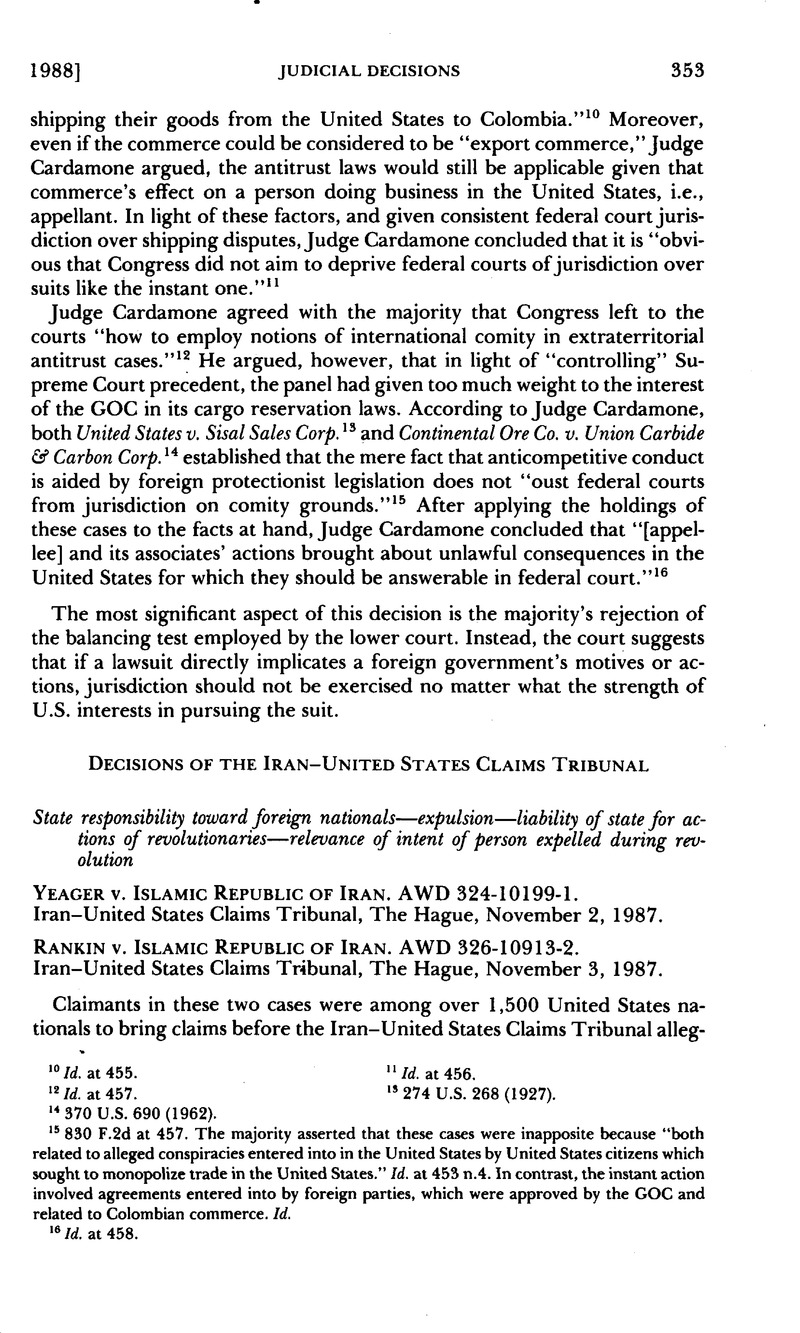No CrossRef data available.
Published online by Cambridge University Press: 27 February 2017

1 These two cases were assigned to Chambers One and Two with the intention that rulings in these cases, together with one other expulsion case assigned to Chamber Three (infra note 2), would provide guidance as “representative cases” for the other claims alleging expulsion. See Separate Opinion of Judge Brower with Respect to Orders in Cases 10159 et al. (June 4, 1986), reprinted in Iranian Assets Litigation Rep., June 13, 1986, at 12,403.
2 Short v. Islamic Republic of Iran, AWD 312-11135-3 (July 14, 1987) (Chamber 3), summarized in 82 AJIL 140(1988).
3 AWD 324-10199-1, slip op., paras. 50, 74 [hereinafter Yeager].
4 The Revolutionary Guards or “Revolutionary Komitehs” served as a de facto security force loyal to the Ayatollah Khomeini during the revolution. Soon after the victory of the revolution, they were officially incorporated into the Government. Id., paras. 39–40.
5 Id., paras. 8–14.
6 Id., paras. 19–23.
7 Id., para. 42 (citing Draft Articles on State Responsibility adopted by the International Law Commission on first reading, Art. 8(a), [1980] 2 Y.B. Int’l L. Comm’n, pt. 2 at 30–34, UN Doc. A/CN.4/SER.A/1980/Add.1).
8 Id., paras. 42–48. Since Yeager’s arrest occurred after the declaration of the new revolutionary Government, the Tribunal was not called upon to consider a state’s responsibility for acts committed by a successful revolutionary movement before it obtained power.
9 Id., paras. 49–50. The Tribunal did not consider whether the expulsion was a violation of the Treaty of Amity, Economic Relations, and Consular Rights between the United States and Iran, Aug. 15, 1955, 284 UNTS 93, TIAS No. 3853, 8 UST 899 [hereinafter Treaty of Amity]. Cf. infra note 15, Chamber Two’s discussion of Iran’s liability under the Treaty of Amity.
10 Yeager, slip op., paras. 17, 55–59.
11 Id., paras. 61–67.
12 Id., para. 60. The Tribunal declined to rule on a final claim for funds frozen in Yeager’s account with Bank Mellat, a Government-controlled bank. The Tribunal declared that the legality of Bank Mellat’s refusal to release the funds depends on the validity under international law of certain postrevolutionary exchange control regulations but, for unstated reasons, it deferred resolution of that issue until a later stage. Id., paras. 70–71.
13 AWD 326–10913–2, slip op., paras. 3–10 [hereinafter Rankin]. BHI terminated Rankin’s employment contract after he left Iran. Id., para. 10.
14 Id., para. 39.
15 Nevertheless, the Tribunal concluded that anti–American statements made during that time by the revolutionary leaders were inconsistent with the requirements of customary international law as well as the Treaty of Amity, supra note 9, and stated that Iran would be liable for any damages to U.S. property interests “caused by these [anti-American] pronouncements, and . . . not just the result of the general unrest and mass demonstrations of the revolutionary period.” Rankin, slip op., para. 30(c).
16 Id., paras. 28, 30(d).
17 Id., para. 28.
18 Id., para. 30(e).
19 Id., paras. 38–39.
20 AWD 312-11135-3, supra note 2.
21 The Tribunal’s refusal to adapt traditional concepts to meet the new circumstances of the Iranian Revolution drew a sharp dissent in Short from the American arbitrator, Charles N. Brower. Id.
22 The Chamber found the adoption of the policy to have occurred sometime between the return of the Ayatollah (Feb. 1) and the proclamation of the Islamic state (Feb. 12).
23 Chamber One at no time considered whether Yeager had intended to remain indefinitely in Iran, focusing only on his treatment by the Revolutionary Guards, which was, after they were in the hotel, apparently identical for Yeager and Rankin. See id., paras. 35–38.